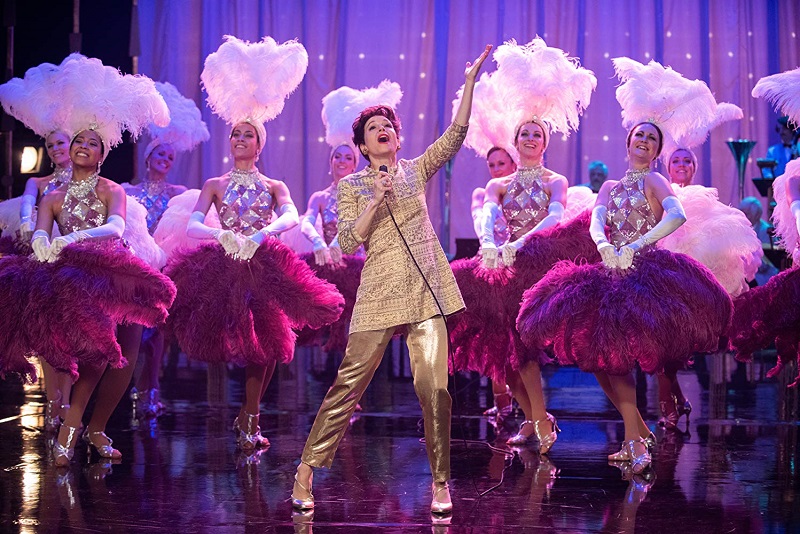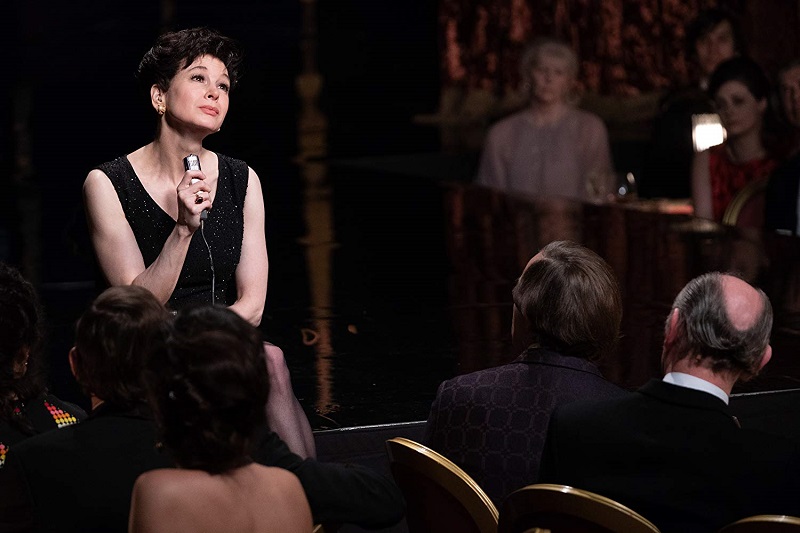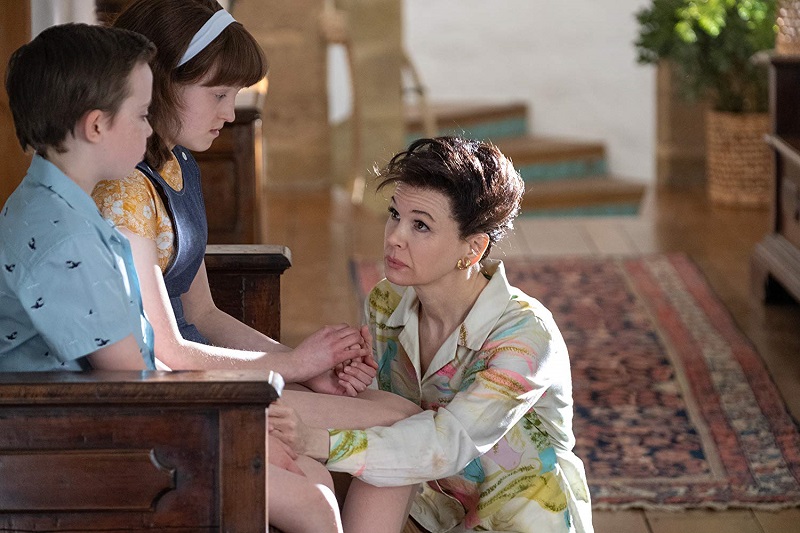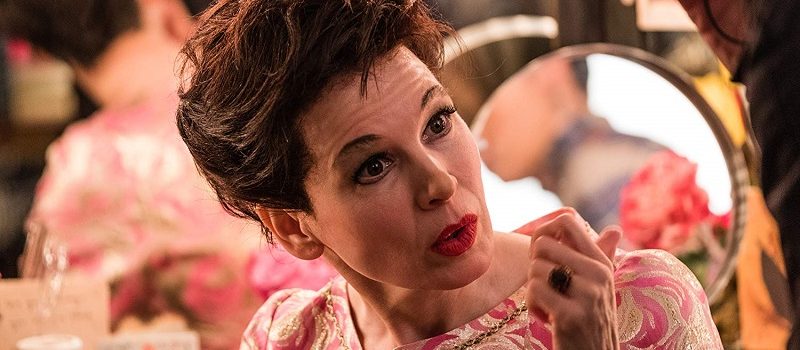One of my biggest cinematic pet peeves is when a biopic is not handled well by those charged with telling someone’s true tale. No one ever remakes a biopic, so you get one shot to capture a life in the best way possible that salutes the individual, translates to the masses why they are so extraordinary and above all else, provide a film experience for the viewer that is as enlightening as it is entertaining. Judy, thankfully, does exactly that.

Oscar winner Renee Zellweger could easily hear her name called as a second-time Academy Award winner for her revealing and emotionally charged portrayal of Judy Garland. The woman who announced her talent prowess to the world as a teenager with her portrayal of Dorothy in The Wizard of Oz, notoriously had a rough go of it, both on the stage and screen and behind the scenes with her personal life. There were demons, many that ultimate robbed her of old age as she passed away at the age of 47. Judy lays out how those issues came to be (MGM head Louis Mayer finds himself in the cross-hairs of Rupert Goold’s biopic) and meticulously gives us a snapshot of a legendary life and a sad, almost tragic, demise.
Tom Edge crafted a rich screenplay. He was given an enormous leg up on the biopic treatment due to the fact that his script was based on the stage play by Peter Quilter, End of the Rainbow. It masterfully focuses on a single period of her life, albeit one near the end. As such, it serves as a perfect time and locale to embody Garland’s struggles, passions, faults, maternal desires and failings.
It was 1968 and the fading superstar still was hugely popular in London. Even though it meant leaving her children behind, the performer had little choice but to head to the UK and perform a series of sold-out shows that would put her back on the zeitgeist’s radar, money in her bank account (something she was sorely lacking) and get her going down the road of being able to live out her dream—which at this point of her life was to provide a stable home for her two young kids (Lorna Luft and Joey Luft) and to be there every single moment as they grew up. That was something she wasn’t able to achieve with raising Liza Minnelli (Gemma-Leah Devereux).
Problem was, she had no home. The hotel she was living in essentially kicked her and her kiddos to the curb and that found her landing on the doorstep of her ex, Sidney Luft (Rufus Sewell). As seen in Judy, it is an emotionally devasting moment. Mother must leave her children, so that she can earn money in order to keep her kids. She heads to London and to say her head is not in it, well that is a gross understatement. But once she gets on that stage and the sound of the audience swells, a light goes off inside of Garland that is utterly electric.
Goold and his storytelling team employ flashbacks to fill in those past history blanks that are all-too important to leave out when telling the true tale of one of pop culture’s greatest voices. We see her struggle with the idea of not having “normal” teenage years as she is on a soundstage making one of the greatest movies of all-time. There’s also the terrible way in which the studio system worked with its stars, particularly women. Everything she did was controlled—from what she ate, to who she “dated” and even the pills that they provided her to curb her appetite, help her fall asleep and most importantly, pills to help her wake up and work 18 hours days, all without a shred of sympathy from anyone on the studio side of things. If you have ever wondered how someone like Garland wound up addicted to the various pills that were as part of her life as breathing and water, it is all laid out there from those early days in Hollywood. Don’t think I will ever look at The Wizard of Oz the same way again.
Garland’s struggles are so brilliantly encapsulated through her London residency and those flashbacks that Judy, above all else, is a searing indictment of the studio system and in particular, Mayer. What else is gleaned from this mesmerizing film is her innate talent that firmly has us believing that the troubled star did what she was put on this earth to do, it’s just that those around her failed her immensely on so many levels—all superbly captured in Edge’s screenplay.

Judy is Zellweger’s triumph. Honestly, triumph is too tame of a word to describe what the decorated actress achieves with her latest. Garland’s family should be over the moon with not only how their matriarch was embodied by the Jerry Maguire star, but also how the entire biopic was crafted. There has always been an appreciation of the highest order for the singer/actress in entertainment circles, but that revering has found new unforeseen heights with Judy. Specifically, what Zellweger does so delightfully well are the minute nuances that an actress of lesser ability, insight and experience may have overlooked. See, the flashbacks to making The Wizard of Oz inform the present. What Garland experienced during the tumultuous making of the classic musical ricocheted through her subconscious for her entire existence. There is an inherent and fresh understanding of how such a talent could throw it all away when one becomes keenly aware of the full, 360-degree picture that is the snapshot of a celebrated life.
Zellweger, herself, walked away from Hollywood at the peak of her fame and for six years! The actress was equally known as a go-to rom-com star, as well as an emotionally riveting thespian whose talent seemingly was only just having the surface scratched. She was 40 at the time. What she did was unheard of, especially given the lack of opportunity (tragically) for women over a certain age in Hollywood. It likely saved her. That was not an option for Garland, who had to take the work where she could get it. Near the beginning of the movie, the superstar does a little gig—just to get some dollar-bills in her pocket. She pockets $150 (yup, that’s it) and by the time she is done riding in cabs around Los Angeles trying to find a place for her and her children to lay their heads for the night, most of the cash is gone. After depositing her kids at Luft’s home, Garland finally lands at her daughter Liza’s abode in time for a party. It would also be the site where she would meet the man who would become her next (and final) husband Mickey Deans—portrayed by Finn Wittrock of Unbroken fame.
The musical numbers are sublime and produce a fair share of emotive response. Do not want to provide any context for fear of spoilers, but let’s just say that when an icon sings an iconic song, there was not a dry eye in the house. How that particular scene is handled is nothing short of brilliant and don’t be surprised if you run to your computer to research how it all really went down.

The ultimate sacrifice for any mother is to leave her children behind, knowing that they are better off without you. That is just one of the takeaways from Judy that is just so bloody haunting. During one of those flashbacks, Mayer asks Garland if she would rather trade all of this in and head back to that “average” life and probably turn out to be a nurse, or an elementary school teacher or … a mother. It is at that moment that he has gotten Garland’s attention. The studio exec portrays it as a weakness and clearly, he has struck a chord with this 16-year-old girl who honestly has probably never seriously thought of parenthood up until that point. But, through Goord’s masterful direction, it has an impact. Thus, when our protagonist is faced with removing herself from the lives of her children and flying 6,000 miles away to make money with the distant hope that it will actually bring her closer to that motherhood dream that for so many is just a given, it is cinematically almost too much to witness. The heart hurts watching Garland struggle. While in London, everything is a challenge—but she has one eye on the present and one eye on the prize, reuniting with her kids. How that all plays out is just one of many tragedies of Garland’s life.
When it comes to biopics and where Judy lands, it will score quite high with longtime fans of Garland and new ones will absolutely be made thanks to Zellweger’s turn. The Buddy Holly Story is one that comes to mind when thinking about Garland’s cinematic life story. The Gary Busey starring, Oscar nominated rocker, has stood the test of time and has served as the definitive look at the life of a rock icon. I believe the same thing will happen with Judy. It lovingly captures the virtuosity of Garland as affectionately as the film portrays her tribulations.
Grade: A

